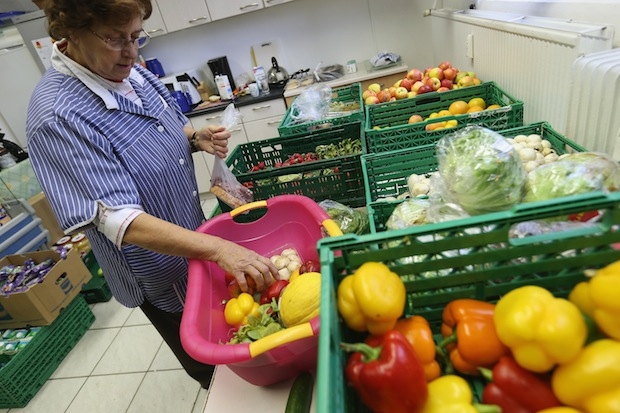Today’s figures from the Trussell Trust on food bank use were good fodder for Labour at PMQs. But the message from the charity, which I profiled for the Spectator a few months ago, is that there needs to be a proper parliamentary inquiry into food poverty, which sounds eminently more sensible than people shouting at each other about complacency. Chief executive Chris Mould said this morning:
‘We said in April that the increasing numbers of people turning to foodbanks should be a wake-up call to the nation, but there has been no policy response and the situation is getting worse. The level of food poverty in the UK is not acceptable. It’s scandalous and it is causing deep distress to thousands of people. The time has come for an official and in depth inquiry into the causes of food poverty and the consequent rise in the usage of foodbanks. As a nation we need to accept that something is wrong and that we need to act now to stop UK hunger getting worse.’
Fortunately sensible MPs Frank Field and Laura Sandys are setting up an all-party parliamentary group on hunger and food poverty. Field is also meeting the Prime Minister soon to discuss his call for a public inquiry on the matter. This is important: as I wrote recently for the Telegraph, the last thing the food debate needs is for things to turn so sour that there is no real attempt to get to the bottom of the causes of food banks. Food banks are a good thing in that they show that communities are strong and responding to a problem that the state either creates or can never solve, but the reasons behind food bank demand are not good things at all, and it would be better to look at those reasons than to blather on about how much demand rose by under which government.
There is one other thing that the government needs to do in response to these figures. Ministers must make it clear that there is a safety net to prevent people from requiring long-term support from a food bank, and respond if there are holes in that net. Currently Trussell Trust banks only allow three parcels per voucher (all food bank clients are referred from an agency or support worker such as JobCentre Plus, social workers or teachers: previously those who families in crisis turned to who for discretionary help anyway. Before food banks were set up in this country, it was down to whether a teacher or a social worker had the cash to help someone without food in their cupboards or not). When agencies try to abuse food banks by repeatedly referring claimants to them, they are given short shrift by the charities.
But the Trussell Trust worries that certain benefit changes may leave claimants with a shortfall in their income that means they need food banks more regularly. In these instances, discretionary housing payments should kick in, but there is, even within the government itself, a fear that the pot of money allocated for this is just not big enough. I understand that there have been a number of ‘frank discussions’ about the size of the DHP pot in the past few months, but ministers connected to the reform seem dissatisfied and are now referring to the underoccupancy cut in housing benefit (or the ‘bedroom tax’ or ‘removal of the spare room subsidy’ if you belong to a particular political tribe) as ‘Lord Freud’s idea’, which is an attempt to distance themselves from this policy as they realise that even though the underlying principle is right, the implementation and branding have backfired.
Number 10 took too long to work out how to respond to the growth of food banks, and so Labour has framed the debate. But there are still things that this government can do to show that it is not complacent about the rise in the number of people needing emergency food parcels.







Comments